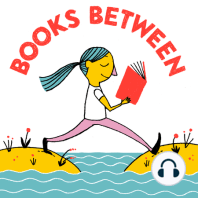25 min listen
#19 - Rethinking Reading Logs
ratings:
Length:
25 minutes
Released:
Mar 13, 2017
Format:
Podcast episode
Description
Intro Hi and welcome to Books Between - a podcast for teachers, parents, librarians, and anyone who loves middle grade books. I’m your host, Corrina Allen - a mom of two daughters and a 5th grade teacher in Central New York. My goal is to help you find fabulous books for your kids and help create a community where we all can support each other as we build those readers. This is Episode #19 and today we are discussing ways to get away from reading logs and featuring three incredible science fiction/fantasy graphic novels. Main Topic - Rethinking Reading Logs Our main topic today is rethinking reading logs. This topic has been on my mind for a couple of years but I recently got fired up about it again when I came across a great article by Shaelynn Farnsworth called “6 Alternatives to Reading Logs”. (As always, I’ll link to that in the show notes.) First, we’ll define what a reading log is, chat about why they are popular and sometimes valuable, we’ll discuss some potential problems with traditional reading logs, and then I’ll share eleven great alternatives that you can start using tomorrow. What is a Reading Log? Traditionally, reading logs are a worksheet where students record the titles of books they’ve read, including a daily tally of minutes or pages. Usually, teachers ask parents to sign them. For example, my 2nd grade daughter has a weekly sheet where she colors in a box for every ten minutes she’s read at home. She writes a reflection on the bottom and we’re supposed to sign it every week. Lately this kind of reading log has gotten some pushback - from both teachers and parents. You probably have an opinion about them. Why are Reading Logs popular? What’s the purpose and the benefit? Some of it may have to do with teachers just going on autopilot and using practices they are familiar with from colleagues or their own schooling. That’s why I used them for so long. I think also we teachers are looking for tangible evidence that kids are reading and reading outside of school. Also, reading logs are a way to communicate the importance of reading to students and parents and an attempt to get families involved in nightly reading routines. Because many strong readers do record at least some aspects of their reading, and we have this instinct to track habits we want to encourage in ourselves - your eating habits or steps on a Fitbit. Also - sometimes Reading Logs are used to try to motivate kids to read more and to award prizes. I think that can work for short periods of time - we recently had a two week reading challenge at my school where everyone - kids and staff - were challenged to read 100,000 minutes in two weeks. It was quick and fun but not for the whole year. Tracking reading can be a powerful tool when kids know the purpose and it’s for their own reflections and not a “gotcha”. If you want to learn more about some authentic ways to track reading, we covered that in Episode 8. I’ll drop a link to that in the show notes or you can just scroll back down in your app after you’re done with this episode. What are some downsides to Reading Logs? Reading Logs - especially the year long parent signed minute tracking type can be problematic. You and I know that lots of them are faked. Heck - I’ve even “fudged” my own children’s! Now - to be clear - I didn’t lie about how many minutes she read or faked a signature or added on more time. But sometimes it got to be Sunday night and we’d forgotten to jot down the minutes and so we’d estimate how much she read each night and use different colored pens so it’s not obvious we filled it all in the night before. If I am doing that, you know for darn sure that most families are doing something similar at least some of the time. And if there’s a penalty for not turning them in, it creates a situation where kids are punished for home environments that make it difficult for them to get daily signatures. And it can create contention at home. And I never want reading time to
Released:
Mar 13, 2017
Format:
Podcast episode
Titles in the series (75)
#19 - Rethinking Reading Logs: Today we are discussing ways to get away from reading logs and featuring three incredible science fiction/fantasy graphic novels. by Books Between Podcast
